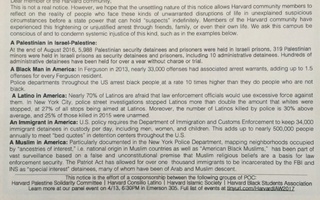{shortcode-09bf9d23d05bd3b3333518cd7ee693f472dd403e}
Students returning to their rooms last Sunday night received a frightening mock notice in their door baskets, informing them that the “Harvard Special Investigation Unit” had detained a member of their dorm. The flyers, designed by the Palestine Solidarity Committee and co-signed by the Harvard Concilio Latino, the Harvard Islamic Society, and the Harvard Black Students Association, were almost immediately the subject of controversy on campus. Some of these student groups have since released apology statements, acknowledging that while they were meant to raise awareness for a panel on mass incarceration and deportation, the flyers were deeply insensitive to students for whom these topics can be risks in their daily lives.
We feel that it is important to recognize that the student groups involved in producing and distributing the fake notice had good intentions. They were working on challenging issues that are very pertinent to members of the student body. The notice’s traumatic effect indeed underscores that many unfortunately continue to feel threatened in the current political environment. This palpable fear felt by undergraduates personally affected by deportation and mass incarceration demonstrates that more work needs to be done to protect their safety on campus, and Harvard should play a greater role in assuaging this fear.
Yet the method by which these groups chose to publicize their advocacy work was unequivocally wrong. In an effort to draw attention in an oversaturated market of extracurricular events, resorting to the satirization and appropriation of such serious issues is tasteless and can cause harm.
While the flyers aimed to elicit the same emotional reactions that real victims of deportation and indefinite detention face, manufacturing this fear in students is self-serving and unproductive. The students most affected by the flyers were those already personally familiar with these issues. Few were warned ahead of time, and some believed that these notices were real, triggering deeply rooted fears. It is unlikely that the notices evoked a similar reaction in people untouched by these issues, and thus these flyers had a disproportionate impact on the very students they intended to serve.
In the future, we urge student groups handling sensitive topics to reflect on the gravity of their rhetoric and mechanisms for seeking publicity. Despite the best of intentions, actions can inadvertently harm other students and the campus. In this case, more direct attempts to publicize the panel event mentioned in the notice would have been preferable.
The controversy generated by these flyers has indeed distracted from real cases of deportation and mass incarceration in the United States. Each student group involved has an important perspective to contribute to this conversation, but we hope that in the future, they are able to speak out in a way that gets their real messages across.This staff editorial solely represents the majority view of The Crimson Editorial Board. It is the product of discussions at regular Editorial Board meetings. In order to ensure the impartiality of our journalism, Crimson editors who choose to opine and vote at these meetings are not involved in the reporting of articles on similar topics.
Read more in Opinion
Not All Clothing is FashionRecommended Articles
-
Gays at HarvardTo the Editors of The Crimson: Friday night, August 3 at Phillips Brooks House, the Divinity School Lesbian and Gay
-
University Called Anti-UnionMembers of a student coalition formed in support of a fired Dining Services cook yesterday charged that the University has
-
MOVIEGOERSince Pearl Harbor, Hollywood has been trying to turn out a good war picture. At last something has come. "Air
-
Bremen Flyers Saved From Throngs of Legionaries by Rear Kitchen Elevator--Say Airplanes Will Outlast ZeppelinsBatteries of cameras had ceased clicking and the last flashlight had done its part in filling the room with clouds
-
 Fake ‘Investigation Unit’ Notice Sparks Controversy, Apologies
Fake ‘Investigation Unit’ Notice Sparks Controversy, Apologies













